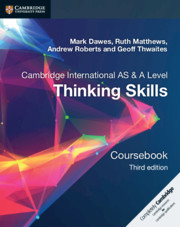Universities and employers have high expectations for 21st century learners. They want students who can think critically, collaborate efficiently and produce creative solutions to problems. With more practice questions than the previous edition, this coursebook provides opportunities for students to improve both their critical thinking and problem solving skills. It walks students through different scenarios – such as drawing conclusions from arguments – explaining the thinking process involved and helping to increase confidence when thinking independently. Suggested answers to the coursebook questions are in the teacher’s resource.
Features
- Exam-style questions throughout the book give students opportunities to practise their skills and build confidence with Cambridge AS & A Level Thinking Skills.
- Published by the experts that brought you other skills-based syllabuses – Global Perspectives and English General Paper.
- Example activities with commentary show how to approach questions and help students to understand critical thinking and problem solving concepts.
- Two clear parts – critical thinking and problem solving – make it easy to co-teach.
Table of Contents
- Introduction
- How to Use This Book
- Section 1: Problem Solving
- 1. What do we mean by a 'problem'?
- 2. Selecting and using information
- 3. Processing data
- 4. Working with models
- 5. Solving problems by searching
- 6. Finding methods of solution
- 7. Trends in data
- 8. Transforming data
- 9. Summarised Data
- 10. Identifying features of a model
- 11. Necessary and Sufficient Conditions
- 12. Changing the scenario of a problem
- Section 2: Critical Thinking
- 13. An introduction to critical thinking
- 14. Claims, statements, and assertions
- 15. Assessing claims
- 16. Grounds, reasons, and evidence
- 17. Evaluating evidence: a case study
- 18. Statistical evidence
- 19. Uses of evidence: inference and explanation
- 20. Identifying argument
- 21. Analysing argument
- 22. Interpretation
- 23. Assumptions
- 24. Evaluating argument
- 25. Applying logic
- 26. Longer texts
- 27. Multiple sources
- Glossary
- Index
- Acknowledgements.
Advice on useful tools
Advice on useful tools, activities and timetabling from teachers experiencing school closures.
Cambridge GO
All our supporting resources have now moved to Cambridge GO – the new home for your Cambridge digital content.
Listen to our podcast
Listen to our podcast to discover teaching inspiration & advice from leading educational thinkers.




